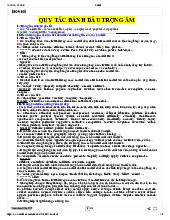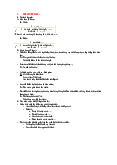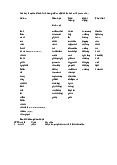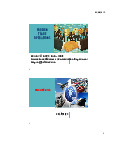


Preview text:
03:10 9/8/24
Outline-communication-workshop-11 Nhóm-5-1
What’s legal and what’s not in sale messages and online reviews OUTLINE: 1. Introduction
● Briefly introduce the topic of deceptive advertising.
● Discuss the prevalence of these tactics in today’s digital age 2. Theory
● What is legal in sales messages? -
Honest: Ads must tell the truth. -
Proof: Ads must have proof to support what they say. - Fair: Ads can’t be unfair. -
Endorsements: If someone is paid to promote a product, it must be said. -
Comparisons: Ads can compare products, but must be honest. -
No Copying: Ads can’t use others’ work without permission. -
Privacy: Ads must respect your personal information.
What is legal in sales messages?
What is legal in sales messages?What is legal in sales messages? ● Puffery -
Companies exaggerate product qualities to make them seem better than they might actually be. -
Examples include fast food restaurants claiming to have the "best burgers in the
world" or shampoo companies promising "perfectly shiny and smooth" hair. -
Puffery is subjective and generally viewed as an opinion rather than a factual statement. -
Advertisements like "Less wrinkles in only minutes" may be considered
puffery, targeting naive consumers. -
Puffery is acceptable as long as it doesn't involve false or misleading claims. ● Deceptive marketing -
Companies make false claims about their product's efficacy. -
Examples include misleading health claims, such as a product curing diseases
when it's just functional food. -
Deceptive advertising is more serious than puffery and can result in substantial financial fines. -
Companies like Volkswagen and Uber faced hefty fines for false advertising
regarding clean fuel and driver salaries, respectively. ● Celebrities -
A marketing strategy that uses a celebrity’s fame and image to promote a brand or product. about:blank 1/3 03:10 9/8/24
Outline-communication-workshop-11 Nhóm-5-1 -
Unauthorized use of name or likeness is the use of someone’s name or other
identifying characteristics without permission for commercial purposes. -
Many celebrities such as Miss Dang Thu Thao, Lai Van Sam, My Linh-Anh
Quan, … are subjected to these marketing strategies. -
Using celebrities’ images without permission can lead to reputational damage,
loss of privacy, and financial exploitation without consent or could also result
in financial penalties for the brand or advertiser involved. ● Misleading promises -
Making fake promises and providing false hopes can affect the reputation of a business. -
Misleading promises not only damage the relationship between a company and
its clients but also weaken trust within the organization. ● Paid online review -
Individuals or entities receive compensation for providing opinions or
evaluations of products/services, often published on various platforms. -
Marketing tools to generate positive publicity and increase brand awareness. -
Reviews must disclose compensation received upfront, be genuine, and avoid false claims.
Example of Disclosure: YouTuber mentioning compensation at the start of a video. -
Deceptive practices are illegal and unethical, leading to loss of consumer trust and legal repercussions.
Example: Some students choosing IELTS centers trust reviews without careful
consideration, leading to financial deception. 3. Case application DIASURE - Cat Tuong
● The product was advertised as the first colostrum product for diabetics in
Vietnam, which is a form of deceptive advertising.
● The product is a nutritional product or food for special diets, not diabetic
colostrum as mentioned in the advertising clips.
● The advertisement made misleading promises such as controlling blood sugar
and completely treating diabetes symptoms.
● Cat Tuong apologized for exaggerating the benefits of this milk. REDBULL about:blank 2/3 03:10 9/8/24
Outline-communication-workshop-11 Nhóm-5-1
● In 2014, Red Bull lost a $13 million lawsuit for false advertising.
● The company had made claims that their product improved concentration and
reaction speeds in consumers, which was considered deceptive advertising. STARBUCK
● Starbucks was sued for making the claim that Starbucks coffee was “The Best Coffee for the Best You”.
● The court found that most of the claims were puffery and the language used in
advertisements was legal puffery. NUTELLA
● Nutella maker Ferrero was sued over deceptive advertising that made the
chocolate-hazelnut spread seem healthy.
● The product labels claimed Nutella was “healthy” and “part of a balanced
meal”, which was misleading considering Nutella’s high sugar and fat content.
● Ferrero agreed to change its nutrition labels and its advertising, in addition to a $3 million payout. about:blank 3/3




